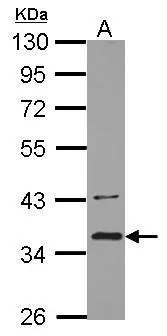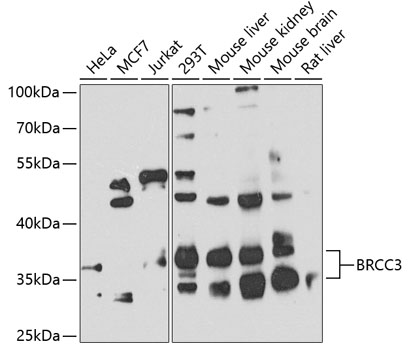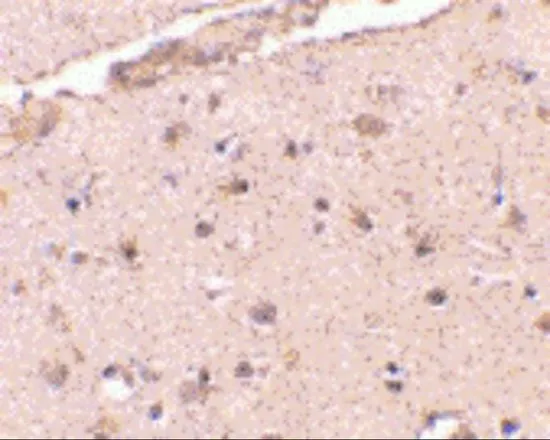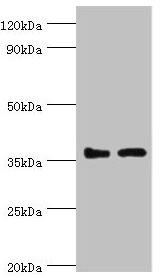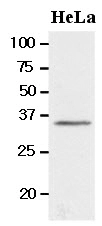
Cell lysates of HeLa(20ug) were resolved by SDS-PAGE, transferred to NC membrane and probed with anti-human BRCC36 (1:1000). Proteins were visualized using a goat anti-mouse secondary antibody conjugated to HRP and an ECL detection system.
BRCC36 antibody [AT3B1]
GTX50015
ApplicationsWestern Blot, ELISA
Product group Antibodies
ReactivityHuman
TargetBRCC3
Overview
- SupplierGeneTex
- Product NameBRCC36 antibody [AT3B1]
- Delivery Days Customer9
- Application Supplier NoteWe recommend the following starting dilutions:Western Blot: Use at 1:1000 ~ 2000.Optimal working concentrations should be determined experimentally by the end user.
- ApplicationsWestern Blot, ELISA
- CertificationResearch Use Only
- ClonalityMonoclonal
- Clone IDAT3B1
- Concentration1 mg/ml
- ConjugateUnconjugated
- Gene ID79184
- Target nameBRCC3
- Target descriptionBRCA1/BRCA2-containing complex subunit 3
- Target synonymsBRCC36, C6.1A, CXorf53, lys-63-specific deubiquitinase BRCC36, BRCA1-A complex subunit BRCC36, BRCA1/BRCA2-containing complex subunit 36, BRISC complex subunit BRCC36
- HostMouse
- IsotypeIgG1
- Protein IDP46736
- Protein NameLys-63-specific deubiquitinase BRCC36
- Scientific DescriptionThis gene encodes a subunit of the BRCA1-BRCA2-containing complex (BRCC), which is an E3 ubiquitin ligase. This complex plays a role in the DNA damage response, where it is responsible for the stable accumulation of BRCA1 at DNA break sites. The component encoded by this gene can specifically cleave Lys 63-linked polyubiquitin chains, and it regulates the abundance of these polyubiquitin chains in chromatin. The loss of this gene results in abnormal angiogenesis and is associated with syndromic moyamoya, a cerebrovascular angiopathy. Alternative splicing results in multiple transcript variants. A related pseudogene has been identified on chromosome 5. [provided by RefSeq, Jun 2011]
- ReactivityHuman
- Storage Instruction-20°C or -80°C,2°C to 8°C
- UNSPSC12352203

